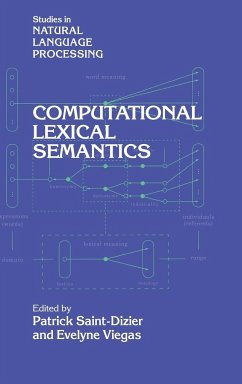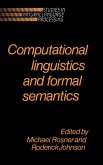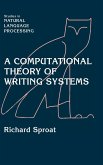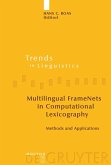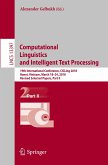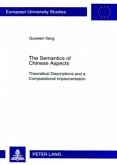Patrick Saint-Dizier / Evelyn Viegas (eds.)
Computational Lexical Semantics
Herausgeber: Saint-Dizier, Patrick; Viegas, Evelyn
Patrick Saint-Dizier / Evelyn Viegas (eds.)
Computational Lexical Semantics
Herausgeber: Saint-Dizier, Patrick; Viegas, Evelyn
- Gebundenes Buch
- Merkliste
- Auf die Merkliste
- Bewerten Bewerten
- Teilen
- Produkt teilen
- Produkterinnerung
- Produkterinnerung
Computational Lexical Semantics is one of the first volumes to provide models for the creation of various kinds of computerized lexicons.
Andere Kunden interessierten sich auch für
![Computational Linguistics and Formal Semantics Computational Linguistics and Formal Semantics]() Michael Rosner / Roderick Johnson (eds.)Computational Linguistics and Formal Semantics128,99 €
Michael Rosner / Roderick Johnson (eds.)Computational Linguistics and Formal Semantics128,99 €![Computational Construction Grammar Computational Construction Grammar]() Jonathan DunnComputational Construction Grammar76,99 €
Jonathan DunnComputational Construction Grammar76,99 €![A Computational Theory of Writing Systems A Computational Theory of Writing Systems]() Richard SproatA Computational Theory of Writing Systems157,99 €
Richard SproatA Computational Theory of Writing Systems157,99 €![Multilingual FrameNets in Computational Lexicography Multilingual FrameNets in Computational Lexicography]() Multilingual FrameNets in Computational Lexicography122,99 €
Multilingual FrameNets in Computational Lexicography122,99 €![Trust the Text Trust the Text]() John SinclairTrust the Text238,99 €
John SinclairTrust the Text238,99 €![Computational Linguistics and Intelligent Text Processing Computational Linguistics and Intelligent Text Processing]() Computational Linguistics and Intelligent Text Processing62,99 €
Computational Linguistics and Intelligent Text Processing62,99 €![The Semantics of Chinese Aspects The Semantics of Chinese Aspects]() Guowen YangThe Semantics of Chinese Aspects122,50 €
Guowen YangThe Semantics of Chinese Aspects122,50 €-
-
-
Computational Lexical Semantics is one of the first volumes to provide models for the creation of various kinds of computerized lexicons.
Hinweis: Dieser Artikel kann nur an eine deutsche Lieferadresse ausgeliefert werden.
Hinweis: Dieser Artikel kann nur an eine deutsche Lieferadresse ausgeliefert werden.
Produktdetails
- Produktdetails
- Verlag: Cambridge University Press
- Seitenzahl: 458
- Erscheinungstermin: 2. Februar 2015
- Englisch
- Abmessung: 235mm x 157mm x 31mm
- Gewicht: 889g
- ISBN-13: 9780521444101
- ISBN-10: 0521444101
- Artikelnr.: 34559130
- Herstellerkennzeichnung
- Libri GmbH
- Europaallee 1
- 36244 Bad Hersfeld
- gpsr@libri.de
- Verlag: Cambridge University Press
- Seitenzahl: 458
- Erscheinungstermin: 2. Februar 2015
- Englisch
- Abmessung: 235mm x 157mm x 31mm
- Gewicht: 889g
- ISBN-13: 9780521444101
- ISBN-10: 0521444101
- Artikelnr.: 34559130
- Herstellerkennzeichnung
- Libri GmbH
- Europaallee 1
- 36244 Bad Hersfeld
- gpsr@libri.de
An introduction to lexical semantics from a linguistic and a
psycho-linguistics perspective Patrick Saint-Dizier and Evelyn Viegas; 1.
Polysemy and related phenomena from a cognitive linguistic viewpoint Alan
Cruse; 2. Mental lexicon and machine lexicon: which properties are shared
by machine and mental word representations? Which are not? Jean Francois Le
Ny; 3. Linguistic constraints on coercion James Pustejovsky; 4. From
lexical semantics to text analysis Sabine Bergler; 5. Lexical functions,
generative lexicons and the world Dirk Heylen; 6. Semantic feature in
generic lexicon Gabriel Bes and Alain Lecomte; 7. Lexical semantics and
terminological knowledge representation Gerritt Burkert; 8. Word meaning
between lexical and conceptual structure Peter Gerstl; 9. The
representation of group denoting nouns in a lexical knowledge base Ann
Copestake; 10. A preliminary lexical and conceptual analysis of BREAK: a
computational perspective Martha Palmer and Alain Polguere; 11. Large
neural networks for the resolution of lexical ambiguity Jean Veronis and
Nancy Ide; 12. Blocking Ted Briscoe, Ann Copestake and Alex Lascarides; 13.
A non-monotonic approach to lexical semantics Daniel Kayser and Hocine
Abir; 14. Inheriting polysemy Adam Kilgarriff; 15. Lexical semantics:
dictionary or encyclopedia? Pierre Zweigenbaum and Marc Cavazza; 16.
Lexical functions of explanatory combinatorial dictionary for
lexicalization in text generation Guy Lapalme, Margarita Alonso and Agnes
Tutin; 17. A lexical-semantic solution to the divergence problem in machine
translation Bonnie Dorr; 18. Introducing LexLog Jacques Jayez; 19.
Constraint propagation techniques for lexical semantics descriptions
Patrick Saint-Dizier.
psycho-linguistics perspective Patrick Saint-Dizier and Evelyn Viegas; 1.
Polysemy and related phenomena from a cognitive linguistic viewpoint Alan
Cruse; 2. Mental lexicon and machine lexicon: which properties are shared
by machine and mental word representations? Which are not? Jean Francois Le
Ny; 3. Linguistic constraints on coercion James Pustejovsky; 4. From
lexical semantics to text analysis Sabine Bergler; 5. Lexical functions,
generative lexicons and the world Dirk Heylen; 6. Semantic feature in
generic lexicon Gabriel Bes and Alain Lecomte; 7. Lexical semantics and
terminological knowledge representation Gerritt Burkert; 8. Word meaning
between lexical and conceptual structure Peter Gerstl; 9. The
representation of group denoting nouns in a lexical knowledge base Ann
Copestake; 10. A preliminary lexical and conceptual analysis of BREAK: a
computational perspective Martha Palmer and Alain Polguere; 11. Large
neural networks for the resolution of lexical ambiguity Jean Veronis and
Nancy Ide; 12. Blocking Ted Briscoe, Ann Copestake and Alex Lascarides; 13.
A non-monotonic approach to lexical semantics Daniel Kayser and Hocine
Abir; 14. Inheriting polysemy Adam Kilgarriff; 15. Lexical semantics:
dictionary or encyclopedia? Pierre Zweigenbaum and Marc Cavazza; 16.
Lexical functions of explanatory combinatorial dictionary for
lexicalization in text generation Guy Lapalme, Margarita Alonso and Agnes
Tutin; 17. A lexical-semantic solution to the divergence problem in machine
translation Bonnie Dorr; 18. Introducing LexLog Jacques Jayez; 19.
Constraint propagation techniques for lexical semantics descriptions
Patrick Saint-Dizier.
An introduction to lexical semantics from a linguistic and a
psycho-linguistics perspective Patrick Saint-Dizier and Evelyn Viegas; 1.
Polysemy and related phenomena from a cognitive linguistic viewpoint Alan
Cruse; 2. Mental lexicon and machine lexicon: which properties are shared
by machine and mental word representations? Which are not? Jean Francois Le
Ny; 3. Linguistic constraints on coercion James Pustejovsky; 4. From
lexical semantics to text analysis Sabine Bergler; 5. Lexical functions,
generative lexicons and the world Dirk Heylen; 6. Semantic feature in
generic lexicon Gabriel Bes and Alain Lecomte; 7. Lexical semantics and
terminological knowledge representation Gerritt Burkert; 8. Word meaning
between lexical and conceptual structure Peter Gerstl; 9. The
representation of group denoting nouns in a lexical knowledge base Ann
Copestake; 10. A preliminary lexical and conceptual analysis of BREAK: a
computational perspective Martha Palmer and Alain Polguere; 11. Large
neural networks for the resolution of lexical ambiguity Jean Veronis and
Nancy Ide; 12. Blocking Ted Briscoe, Ann Copestake and Alex Lascarides; 13.
A non-monotonic approach to lexical semantics Daniel Kayser and Hocine
Abir; 14. Inheriting polysemy Adam Kilgarriff; 15. Lexical semantics:
dictionary or encyclopedia? Pierre Zweigenbaum and Marc Cavazza; 16.
Lexical functions of explanatory combinatorial dictionary for
lexicalization in text generation Guy Lapalme, Margarita Alonso and Agnes
Tutin; 17. A lexical-semantic solution to the divergence problem in machine
translation Bonnie Dorr; 18. Introducing LexLog Jacques Jayez; 19.
Constraint propagation techniques for lexical semantics descriptions
Patrick Saint-Dizier.
psycho-linguistics perspective Patrick Saint-Dizier and Evelyn Viegas; 1.
Polysemy and related phenomena from a cognitive linguistic viewpoint Alan
Cruse; 2. Mental lexicon and machine lexicon: which properties are shared
by machine and mental word representations? Which are not? Jean Francois Le
Ny; 3. Linguistic constraints on coercion James Pustejovsky; 4. From
lexical semantics to text analysis Sabine Bergler; 5. Lexical functions,
generative lexicons and the world Dirk Heylen; 6. Semantic feature in
generic lexicon Gabriel Bes and Alain Lecomte; 7. Lexical semantics and
terminological knowledge representation Gerritt Burkert; 8. Word meaning
between lexical and conceptual structure Peter Gerstl; 9. The
representation of group denoting nouns in a lexical knowledge base Ann
Copestake; 10. A preliminary lexical and conceptual analysis of BREAK: a
computational perspective Martha Palmer and Alain Polguere; 11. Large
neural networks for the resolution of lexical ambiguity Jean Veronis and
Nancy Ide; 12. Blocking Ted Briscoe, Ann Copestake and Alex Lascarides; 13.
A non-monotonic approach to lexical semantics Daniel Kayser and Hocine
Abir; 14. Inheriting polysemy Adam Kilgarriff; 15. Lexical semantics:
dictionary or encyclopedia? Pierre Zweigenbaum and Marc Cavazza; 16.
Lexical functions of explanatory combinatorial dictionary for
lexicalization in text generation Guy Lapalme, Margarita Alonso and Agnes
Tutin; 17. A lexical-semantic solution to the divergence problem in machine
translation Bonnie Dorr; 18. Introducing LexLog Jacques Jayez; 19.
Constraint propagation techniques for lexical semantics descriptions
Patrick Saint-Dizier.

